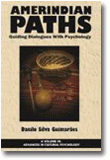
Amerindian Paths
Guiding Dialogues With Psychology
Edited by:
Danilo Silva Guimarães, University of São Paulo
A volume in the series: Advances in Cultural Psychology: Constructing Human Development. Editor(s): Jaan Valsiner, Niels Bohr Professor of Cultural Psychology, Aalborg University.
Published 2016
This book comes as part of a broader project the editor is developing aiming critically to articulate some theoretical and methodological issues of cultural psychology with the research and practical work of psychologists with Amerindian peoples. As such, the project – of which the present book is part – concerns to a meta-theoretical reflection aiming to bring in new theoretical-methodological and ethical reflections to Cultural Psychology. From this meta-theoretical reflection we have been developing the notion of dialogical multiplication as it implies the diversification (differentiation and dedifferentiation) of semiotic trajectories in interethnic boundaries.
CONTENTS
Series Editor’s Preface, Discovering the Real America, Jaan Valsiner. Dedication Notes from the Editor and Acknowledgements, Danilo Silva Guimarães. Editor’s Introduction, Danilo Silva Guimarães. SECTION I: Terms of the Dialogue, Danilo Silva Guimarães. Tzotzil Person Model: A Guide To Understanding Indigenous People’s Behavior And Thought, José Sánchez Barrera. Neither Tupi Nor Tapuia. Free Determination and Social Policies in the Historic Trajectory of the Brazilian Indigenous Peoples, Bruno Simões Gonçalves. Psychosocial Perspective Regarding Ethnocide: A Transdisciplinary Approach in the Context of Human Rights, Juan Cristóbal Aldana. SECTION II: The Situated Topics of the Dialogues, Danilo Silva Guimarães. An Intercultural Perspective on Psychology: Deep Immersion in Indigenous People’s Dramas on in Indigenous People’s Dramas, Rosa Suárez, John Sabogal, and Doris de la Hoz. Institutions, Subjectivity and Culture in Mexican Indigenous Minorities’ Political Representation, Raul Rocha Romero. Schooling and Changes in Child and Family Life in Indigenous Communities of Mesoamerica, Maricela Correa-Chávez, Rebeca Mejía-Arauz, Ulrike Keyser Ohrt, and Kaitlin Black. Paradigms in Arranging for Children’s Learning, Andrew Dayton and Barbara Rogoff. Traditional Indigenous Knowledge and Scientific Knowledge: Interfaces of Mental Health Care in a Xukuru do Ororubá Community, Pernambuco, Edinaldo dos Santos Rodrigues and Luciana Nogueira Fioroni. SECTION III: Implications of Non-Dialoguing, Danilo Silva Guimarães. Consequences of the Invisibility Perpetrated by the Argentinian State Against Indigenous People, Marcelo Valko. The Mocoví-Qom Communities: History, Knowledge, Sufferings, and Subjectivity(ties), María Zulma Pirini. The Psychological Context of Guarani-Kaiowá Who Commit Suicide in the City Of Dourados, Mato Grosso do Sul, Brazil, Fabiane Vick and Sonia Grubits. SECTION IV: Possibilities of Dialogue, Danilo Silva Guimarães. Anthropology, Psychology and Many Others: Reflections on Experiences of Interdisciplinarity in Health Assistance For Indigenous People, Vanessa Caldeira. Madre Ñame and the Nonam: One and Another, Hernán Sánchez and Livia Simão. Cross-Cultural Analysis in Brazilian and Mexican Children’s Drawings, Sonia Grubits, Heloisa Bruna Grubits, and José Angel Vera Noriega. Contributions of a Transdisciplinary Approach (TD) to the Dialogue Between Psychology and the Traditional Knowledge (TK) of Indigenous Peoples, Luiz Eduardo V. Berni. From the Encounter With the Other to a Cultural Psychology: Diatopic Hermeneutics as a Reference in an Intercultural Dialogue About Madness, Ermelinda Salem. SECTION V: Psychology in the paths of Amerindian peoples. Final Considerations, Danilo Silva Guimarães.
-
Paperback9781681233451
Web price: $45.04 (Reg. 52.99)
-
Hardcover9781681233468
Web price: $80.74 (Reg. 94.99)
- eBook9781681233475

- PSY000000 - PSYCHOLOGY: General
- PSY031000 - PSYCHOLOGY: Social Psychology
- PSY002000 - PSYCHOLOGY: DEVELOPMENTAL: Adolescent
-
 Culture, Work and Psychology
Invitations to Dialogue
Culture, Work and Psychology
Invitations to Dialogue
-
 Deep Loyalties
Values in Military Lives
Deep Loyalties
Values in Military Lives
-
 Drama of Multilingualism
Literature Review and Liberation
Drama of Multilingualism
Literature Review and Liberation
-
 From Dream to Action
Imagination and (Im)Possible Futures
From Dream to Action
Imagination and (Im)Possible Futures
-
 Home in Transition
The Cultural Construction of Heimat
Home in Transition
The Cultural Construction of Heimat
-
 Making of Distinctions
Towards a Social Science of Inclusive Oppositions
Making of Distinctions
Towards a Social Science of Inclusive Oppositions
-
 Ornamented Lives
Ornamented Lives

